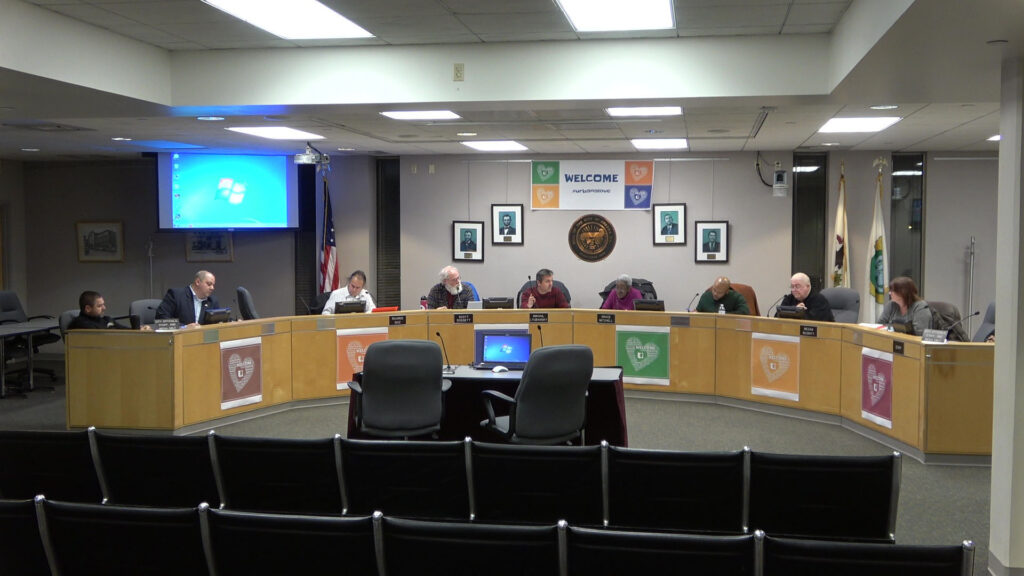
For the past seven Urbana City Council meetings, residents have lined up to deliver what has amounted to several hours of criticism and dozens of misconduct allegations against the Urbana Police Department. Sparked by the violent arrest of an Urbana resident captured on video by vigilant civilians, this incident has brought the most prolific and persistent public presence to City Council in years.
A common theme recited by many: where does our Civilian Police Review Board stand in this picture? Unfortunately, unless someone who was physically present manages to file a complaint, Urbana Police Chief Bryant Seraphin claims that the civilian board has no power to review the incident.
The Urbana Civilian Police Review board, frequently shortened to “CPRB”, was created in 2007 thanks to local grassroots efforts. Unfortunately, the ordinance ultimately passed by City Council was not exactly what the founders had in mind. Much of the investigative and disciplinary powers of the board were stripped away from the initial proposal, leaving the CPRB in a state that some residents have called a “rubber stamp” for the police department.
The requirement to personally witness an incident is not the only restriction that limits the usefulness of the CPRB. Civilian complaints are frequently denied by the Police Department and City staff for any number of creative reasons. Strictly enforced time restrictions, requirements to have forms notarized, jurisdictional obstacles invented by City Legal, and a seemingly bottomless bag of administrative trickery leave the public with little means for access.
According to Deputy Chief Richard Surles, if a complainant so much as utters any statement about wishing to sue the police, even an empty threat, they have forfeit their opportunity for redress through the CPRB complaint process.
More recently, the level of public access to the CPRB has gotten substantially worse. Since Mayor Marlin locked down the City Building during the COVID-19 pandemic, residents can no longer access the police services window to submit complaint forms and have them notarized. A complainant must have internet access, a printer, access to a licensed notary, and a scanner to be able to submit a complaint by email. This obstacle course may be somewhat manageable for less-equipped residents, if only the public library weren’t also closed.
Marlin has refused to extend the 45 day complaint submission deadline, even during the pandemic. At the same time, Chief Seraphin and his staff have been frequently violating the time constraints placed upon the Police Department to respond to complaints. According to the City Code, the Police Department is supposed to send a simple letter of receipt by certified mail within 14 days of a complaint filing, but Chief Seraphin has recently been waiting more than a month before issuing receipt letters. For complainants, the double standard is one more painful reminder of the hopeless power dynamic between civilians and the police.
Were it not for the notary requirement, which appears to be one of pure invention by the Urbana Police Department (the City Code makes no mention of a notary requirement), public access to the complaint process would be greatly increased.
As drawn out by residents at the past three CPRB meetings, and at the past seven City Council meetings, the problems with the CPRB are not limited to their restrictive ordinance. The CPRB has been in a state of quiet dissolution for the past several years. The board has not been receiving or reviewing civilian complaints for years, and there is no indication that they have been keeping a complaint registry, as outlined in their ordinance. The CPRB went nearly a year without meeting from 2018 to 2019, and quarterly and annual reports have not been issued by the board since 2014.
By law, the Urbana Police Department is supposed to send copies of police complaints to the CPRB within 7 days of receipt. In practice, it appears that board members haven’t been allowed to see any complaints for the past several years. The CPRB has been flying blind. When this issue was raised by board members during their October 2019 meeting, Human Resources Director Todd Rent and Community Relations Specialist Preston James (a retired Urbana Police officer), fumbled for excuses.
In September of 2019, Chair Grace Mitchell pushed the board to stop reviewing most Taser usage incidents, and the board members voted in agreement. The requirement to review all Taser incidents is outlined in the City Code (Section 19-24), and the CPRB has no legal authority to modify the City Code. For many reasons, this decision is simply puzzling and contrary to the establishment and purpose of the CPRB.
The situation is bleak, and residents who attend CPRB meetings argue that the public simply has no faith in the complaint process. Complainants who have endured the CPRB process have stated that the complaint process itself was more upsetting than the initial police misconduct that triggered it.
There may be a glimmer of hope on the horizon. Recently, and without any announcement or explanation from the Mayor, the position of CPRB Chair has been reassigned to Mikhail Lyubansky. Grace Mitchell is no longer on the CPRB and the Mayor is searching for a suitable candidate to fill the vacancy. Lyubansky is a U of I professor in the Department of Psychology, specializing in restorative justice and racial/ethnic group relations.
Meanwhile, the persistence of the public seems to have finally caught the attention of some City Council members, even if only slightly. After at six consecutive attempts by members of the public to draw the attention of City Council to the quandary that is the CPRB, Ward 4 Alderman Bill Brown finally nibbled. At the May 18 City Council meeting Brown made a motion to review the CPRB reporting requirements at the June 1 meeting, and Maryalice Wu seconded the motion.
Brown and Wu did not expound much on what their expectations from City staff were regarding their motion. No explanation was given for why a review of the CPRB should, for the time being, be limited to the board’s reporting requirements. Perhaps to Brown and Wu, it appeared to be the most passive means for entering the inexplicably untouchable political realm of police misconduct.
It seems clear that Urbana residents have no intention on setting aside their grievances with the Urbana Police Department and the complaint process anytime soon. A full review of the CPRB is imminent, and City Council members will soon be made to realize and acknowledge the abysmal state of the police complaint process. It will be difficult for them to deny the need for significant change, and what was previously untouchable is now inevitable.
-Christopher Hansen
Urbana, IL
